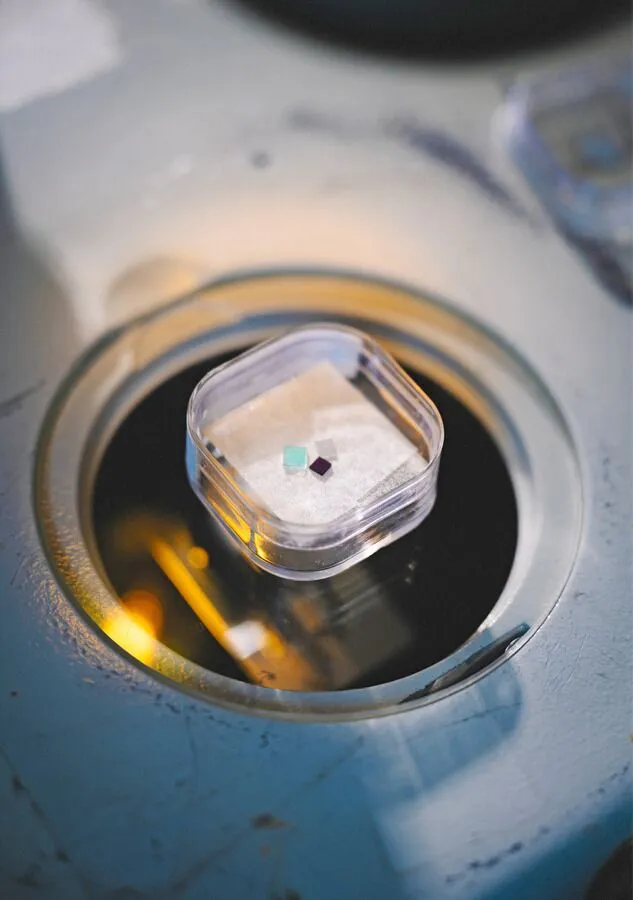Goethe University in Frankfurt is set to install its first quantum computer, named “Baby Diamond”, which will use nitrogen vacancy technology in an artificial diamond. The system, expected to be delivered by Ulm start-up XeedQ GmbH in early 2024, will start as a pilot with five qubits. The quantum computer will be used to tackle complex tasks in computer simulation and AI. Prof. Enrico Schleiff, President of Goethe University, and Ulrich Schielein, CIO and Vice President for Digitalisation, highlighted the potential of quantum computing in various fields including finance, logistics, medicine, and climate research.
Goethe University to Install Its First Quantum Computer
Goethe University is set to install its first quantum computer, named “Baby Diamond”. This pilot system, based on the technology of nitrogen vacancies in an artificial diamond, will start with five qubits. The quantum computer is expected to be delivered by the start-up XeedQ GmbH in the first quarter of 2024. Users from Goethe University and the National High-Performance Computing (NHR) consortium are expected to be the initial users.
Quantum computing is currently a hot topic as a future technology that promises to solve tasks in computer simulation and AI that are currently too large or even unsolvable with digital methods. The installation of the pilot quantum computer is a significant step into this revolutionary field, with more advancements expected to follow. The “Baby Diamond” will provide a glimpse into a future where significant computational challenges can be tackled, some of which are currently unimaginable.
Quantum Computing Applications
Ulrich Schielein, Chief Information Officer (CIO) and Vice President for Digitalisation at Goethe University, added that the quantum computer could potentially address entirely new problem classes from finance, logistics in rail, air and road transport, medicine and biology, weather and climate research, as well as basic sciences like physics and chemistry or the training of basic models of artificial intelligence. This could be achievable within a few years. The university is also looking forward to collaborating with researchers in the Rhine-Main area and local companies and institutions.
Quantum Computer Technology
The quantum computer uses a small artificial diamond, known from industrial applications, in which nitrogen atoms are embedded. These atoms induce a vacancy that can be used as a central qubit. Spins of atoms can be controlled around this defect as additional qubits, making practical quantum computing possible. The system is compact, operable at room temperature, does not require special low-temperature cooling, can be set up in a small laboratory, and is particularly energy efficient.
Quantum Computing Education and Future Plans
The quantum computer is part of Frankfurt’s roadmap, aiming to acquire up to 16 high-quality qubits by 2025 and gradually increase this number in the future. The pilot system will help build an infrastructure at Goethe University in collaboration with the NHR network, closely linking quantum computing with high-performance computing. Goethe University has also managed to secure the Jülich Research Centre with its JUNIQ quantum computing infrastructure as a scientific partner, a global pioneer in modular hybrid quantum-HPC computing.
Quantum Computing Development and History
The system is being developed by XeedQ GmbH, a company based in Leipzig and at the DLR Innovation Centre in Ulm. XeedQ GmbH is supported by the DLR’s quantum computer initiative to develop scalable quantum computer technology. Quantum computing is often referred to as the second quantum revolution. The Goethe University’s quantum computer will be located on the historic grounds of the Bockenheim Campus, where the famous Stern-Gerlach experiment laid the foundation for quantum computing over 100 years ago and was a crucial part of the first quantum revolution. With its “Baby Diamond”, Goethe University is paving the way to bring new quantum revolutions back to Frankfurt am Main.
Summary
Goethe University is set to install its first quantum computer, named ‘Baby Diamond’, which operates on a five-qubit pilot system using nitrogen vacancy technology in an artificial diamond. This quantum computing technology, expected to be delivered by start-up XeedQ GmbH in early 2024, promises to tackle previously unsolvable tasks in computer simulation and AI, and could potentially address new problem classes in finance, logistics, medicine, biology, weather and climate research, and basic sciences.
- Goethe University in Frankfurt is set to install its first quantum computer, named “Baby Diamond”, which will start as a pilot system with five qubits.
- The technology is based on nitrogen vacancies in an artificial diamond.
- The quantum computer is expected to be delivered by the Ulm start-up XeedQ GmbH in the first quarter of 2024.
- Users will include members from Goethe University and the National High-Performance Computing (NHR) network.
- The quantum computer uses a small artificial diamond, known from industrial applications, in which nitrogen atoms are embedded. These induce a vacancy that can be used as a central qubit.
- The quantum computer is part of Frankfurt’s roadmap, aiming to acquire up to 16 high-quality qubits by 2025 and gradually increase this number.
- The system is being developed by XeedQ GmbH, a company based in Leipzig and at the DLR Innovation Centre in Ulm.
- The quantum computer will be located on the historic site of the Bockenheim campus, where the famous Stern-Gerlach experiment laid the foundation for quantum computing over 100 years ago.
- Key individuals mentioned include Prof. Enrico Schleiff, President of Goethe University, Ulrich Schielein, Chief Information Officer (CIO) and Vice President for Digitalisation at Goethe University, and Prof. Thomas Lippert, Head of the Modular Supercomputing and Quantum Computing group at Goethe University.

